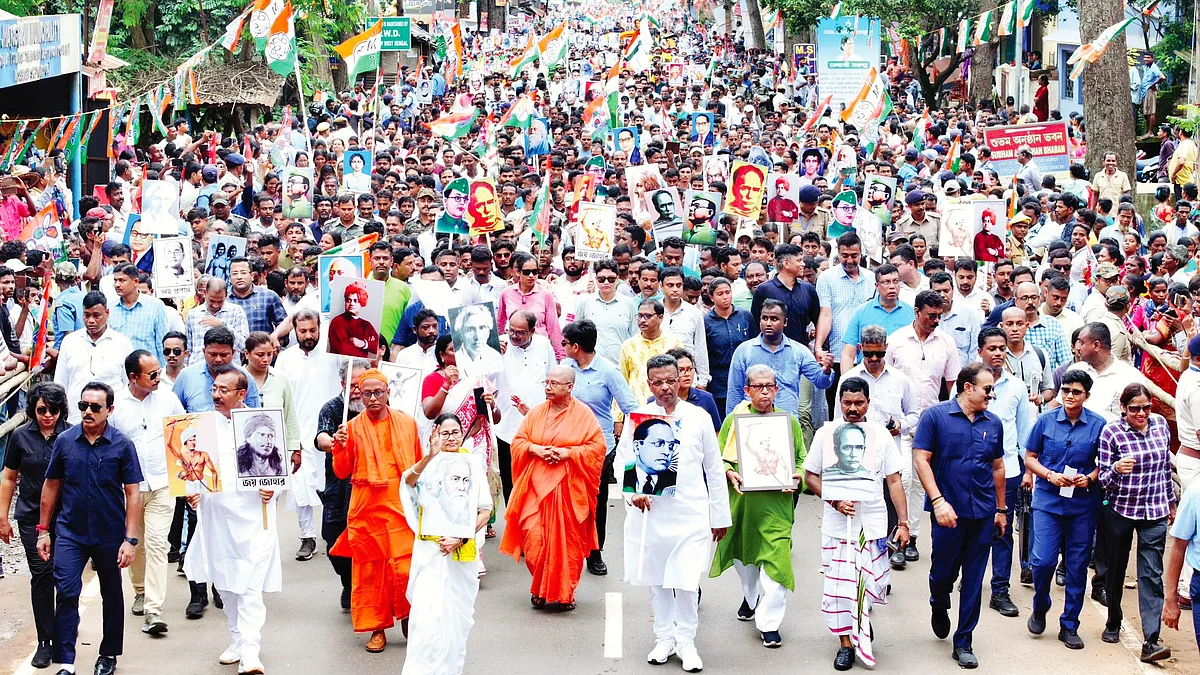POLITICS
West Bengal: BJP’s polarisation politics takes a new turn
Modi and his associates may have inadvertently gifted Bengal to Mamata Banerjee despite strong anti-incumbency

On 3 August, the Indian Express carried a report headlined, ‘Fear grips Bengali-speaking migrants in Noida amid police checks in Delhi-NCR’. In a follow-up dated 7 August, interviewees said they had sent their families back home — to Jharkhand or Kolkata. After what happened in Gurgaon, where Bengali-speaking daily-wage workers were detained during police checks despite presenting valid IDs, they couldn't take a risk.
For Trinamool Congress (TMC) supremo Mamata Banerjee, the crackdown on Bengali-speaking migrant workers — mostly Muslims — in BJP-ruled states was an attack on the Bengali language and culture. This, she announced at a Shaheed Divas rally in Kolkata on 21 July, must be countered through a sustained struggle on the streets — right until state Assembly elections in early 2026.
Incidents reported from Delhi-NCR, Gurgaon, Haryana, Maharashtra, and Chhattisgarh feature prominently in both media and public discourse in Bengal. The BJP continues to claim that detainees are illegal migrants from Bangladesh who have no business being in India; the TMC insists they are migrant workers from different districts, targeted only because they speak Bengali.
What further sharpened the divide was a letter and a tweet. Writing to the officer in charge of New Delhi’s Banga Bhawan in late July, an inspector with the Lodhi Colony police station in Delhi sought assistance for the translation of documents pertaining to a case involving the arrest of eight persons ‘strongly suspected to be Bangladeshi nationals residing in India without any valid passport or visa’. The officer requested the West Bengal government to provide ‘an official translator/ interpreter proficient in Bangladeshi language…’
There was outrage. Identifying ‘Bangladeshi’ as a language was worse than idiotic — it was a giveaway of the BJP’s mindset, its antagonism towards Indians that don’t quite fit its cultural paradigm.
Published: undefined
On 3 August, Amit Malviya, BJP IT cell chief and Bengal minder, posted his defence of the Delhi Police on X: ‘The official language of Bangladesh is not only phonologically different, but also includes dialects like Sylheti that are nearly incomprehensible to Indian Bengalis.
'There is, in fact, no language called “Bengali” that neatly covers all these variants. “Bengali” denotes ethnicity, not linguistic uniformity. So, when the Delhi Police uses “Bangladeshi language”, it is shorthand for the linguistic markers used to profile illegal immigrants from Bangladesh — not a commentary on Bengali as spoken in West Bengal.’
Malviya’s tweet, particularly his reference to Sylheti, spread the conflagration to the North-East, angering leaders in Assam’s Barak Valley, home to a large Sylheti-speaking population. Murmurs of annoyance were heard from Tripura and Meghalaya as well.
According to TMC Rajya Sabha member Sushmita Dev, “It has become clear that the BJP’s top leadership has no clue about the history of the Bengali and Sylheti languages spoken by millions of Indians.” She also said Assam chief minister Himanta Biswa Sarma’s remark — that identifying Bangladeshis would be easier if people declared Bengali as their mother tongue — was “racial profiling aimed at upcoming elections in Assam and West Bengal”.
A defensive BJP argued that Malviya’s remark was misinterpreted. “We are not anti-Bengali. Our stand is ‘detect and deport’. Bangladeshis speak in Bangla; that does not mean we can [let them] settle down en masse in Bengal and make them our vote bank,” said BJP state president and Rajya Sabha member Samik Bhattacharya.
He dismissed the possibility of the controversy working in favour of the TMC in the elections, and said, “I challenge Mamata Banerjee to ensure the victory of a single candidate even in a municipal election from a Bengali-dominated locality.”
Published: undefined
While politicians are expected to toe their respective party lines, Bengal’s civil society is vertically split. Fence-sitters — unable to resist the groundswell of sentiment—are tacitly aligned with the TMC. Former Prasar Bharati CEO and Rajya Sabha MP Jawhar Sircar puts it in perspective. While there are enough Bengalis who would not normally be swayed by Mamata Banerjee’s remarks and activities, when she goes on the warpath against the BJP and its plan to ‘demolish the Bengali community and language’ — they see no option but to endorse her position.
According to Sircar, branding Bengali migrant labourers ‘Bangladeshis’ is part of the BJP’s well-calibrated plan to win elections, with their narrative of West Bengal being overrun by illegal Bangladeshi ‘termites’ who support the TMC.
“Illegal migration of labour is a global phenomenon,” says Sircar. “The US Customs and Border Protection reported that 50 per cent of illegal migrants from India are from Gujarat.” (So far, the US has not branded them termites, simply sent them back in shackles and handcuffs.)
Sircar believes that Modi and his associates have inadvertently gifted West Bengal to Mamata Banerjee in spite of a strong anti-incumbency sentiment.
On social media forums, this anti-TMC frustration is expressing itself through support for the BJP’s eviction drive. Authors, artistes and students have entered the debate, previously confined to educated urban circles. Adept at polarisation politics to win elections, the BJP’s gameplan may well loosen that tightly knit and fiercely defended social fabric the Bengalis call their culture.
Sourabh Sen is a Kolkata-based independent writer and commentator on politics, human rights and foreign affairs
Published: undefined
Follow us on: Facebook, Twitter, Google News, Instagram
Join our official telegram channel (@nationalherald) and stay updated with the latest headlines
Published: undefined